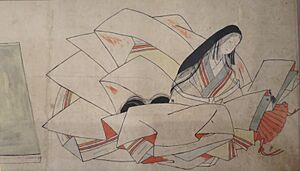Tachibana no Kachiko facts for kids
Quick facts for kids Tachibana no Kachiko橘嘉智子 |
|
|---|---|
 |
|
| Empress consort of Japan | |
| Tenure | August 21, 815 – June 5, 823 |
| Empress dowager of Japan | |
| Tenure | April 23, 823 – March 2, 833 |
| Grand empress dowager of Japan | |
| Tenure | March 26, 833 – June 17, 850 |
| Born | 786 |
| Died | June 17, 850 (aged 63–64) Heian Kyō (Kyōto) |
| Spouse | Emperor Saga |
| Issue | Emperor Ninmyō Princess Seishi Princess Hideko Prince Hidera Princess Toshiko Princess Yoshiko Princess Shigeko |
| House | Yamato (by marriage) Tachibana clan (by birth) |
| Father | Tachibana no Kiyotomo |
| Mother | Taguchi Michihime |
Tachibana no Kachiko (橘 嘉智子, 786 – June 17, 850) was an important Japanese empress. She was also known as Empress Danrin (檀林皇后, Danrin-kōgō). She was the main wife of Emperor Saga. Her father was Tachibana no Kiyotomo (橘 清友). From 833 to 850, she was a very powerful figure in the empire.
Life of Empress Kachiko
Lady Kachiko was born in 786. Her parents were Tachibana no Kiyotomo and Taguchi Michihime. In June 809, she married the new emperor, Emperor Saga. She became the empress consort, which means she was the emperor's chief wife.
Her Children and Family
Empress Kachiko and Emperor Saga had seven children together. They had two sons and five daughters. Their oldest son later became the next Emperor of Japan, known as Emperor Ninmyō. Their oldest daughter, Princess Seishi, married Prince Otomo. He later became Emperor Junna.
Here are their children:
- Husband: Emperor Saga (born 786 – died 842)
- Son: Imperial Prince Masara, who became Emperor Ninmyō
- Daughter: Imperial Princess Seishi (810–879), who married Emperor Junna
- Daughter: Imperial Princess Hideko (died 850)
- Son: Imperial Prince Hidera (817–895)
- Daughter: Imperial Princess Toshiko (died 826)
- Daughter: Imperial Princess Yoshiko (died 836)
- Daughter: Imperial Princess Shigeko (died 865)
Her Beliefs and Legacy
Empress Kachiko was a very religious person. She was a strong follower of Buddhism. She even started a Buddhist temple complex called Danrin-ji. Because of this, people started calling her Danrin-kōgō, which means Empress Danrin.
Empress Danrin was known for her great beauty. She passed away on June 17, 850. Before she died, she made a special request. She asked for her body to be left outside after her death. This was so people could see how the human body changes over time. She wanted to show that beauty and life are not permanent. This event became a famous Japanese folk story. It was even shown in an 18th-century painting called "Nine Stages of Decomposition of the Heian Period Empress Danrin".
 | Shirley Ann Jackson |
 | Garett Morgan |
 | J. Ernest Wilkins Jr. |
 | Elijah McCoy |

